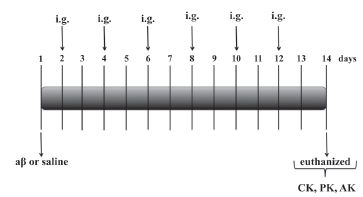ABSTRACT
Considering that Alzheimer's disease is a prevalent neurodegenerative disease worldwide, we investigated the activities of three key kinases: creatine kinase, pyruvate kinase and adenylate kinase in the hippocampus and cerebral cortex in Alzheimer's disease model. Male adult Swiss mice received amyloid-β or saline. One day after, mice were treated with blank nanocapsules (17 ml/kg) or meloxicam-loaded nanocapsules (5 mg/kg) or free meloxicam (5 mg/kg). Treatments were performed on alternating days, until the end of the experimental protocol. In the fourteenth day, kinases activities were performed. Amyloid-β did not change the kinases activity in the hippocampus and cerebral cortex of mice. However, free meloxicam decrease the creatine kinase activity in mitochondrial-rich fraction in the group induced by amyloid-β, but for the cytosolic fraction, it has raised in the activity of pyruvate kinase activity in cerebral cortex. Further, meloxicam-loaded nanocapsules administration reduced adenylate kinase activity in the hippocampus of mice injected by amyloid-β. In conclusion we observed absence in short-term effects in kinases activities of energy metabolism in mice hippocampus and cerebral cortex using amyloid-β peptide model. These findings established the foundation to further study the kinases in phosphoryltransfer network changes observed in the brains of patients post-mortem with Alzheimer's disease.
Key words:
Alzheimer's disease; nanoparticles; meloxicam; energetic metabolism; phosphoryltransfer network





